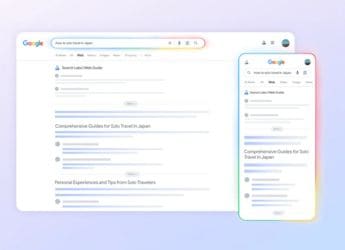Google AI Web Guide Organizes Search Results

Google’s New AI Web Guide: Revolutionizing Search Results
Google is continuously innovating its search capabilities, and the latest experimental feature, the AI-powered Web Guide, is a testament to this commitment. Announced recently, Web Guide is a new filter designed to categorize information and group URLs on the search results page, aiming to simplify the user experience and facilitate deeper exploration of topics. Currently available as an opt-in feature within Search Labs, Web Guide promises a more organized and intuitive way to navigate the vast landscape of online information.
What is Google’s Web Guide?
Web Guide acts as an intelligent layer on top of traditional search results. It analyzes your search query and identifies key aspects, then dynamically organizes the results into relevant categories. This means that instead of a long, unstructured list of links, you’ll see a curated selection of resources grouped by topic, making it easier to find precisely what you’re looking for.
- Categorized Information: Web Guide intelligently sorts search results into distinct categories.
- URL Grouping: Related URLs are grouped together, providing a comprehensive view of the topic.
- Opt-in Feature: Users must actively enable Web Guide through Search Labs.
How Does Web Guide Work?
The magic behind Web Guide lies in its AI-driven approach. Google leverages a custom version of its Gemini AI model, specifically trained to understand both search queries and the content of web pages. This allows Web Guide to not only identify the core intent of your search but also to accurately assess the relevance and context of different websites.
The system employs a “query fan-out technique,” where the AI issues multiple related search queries simultaneously to gather a wider range of perspectives and identify the most relevant results. This ensures that the categorized results are comprehensive and representative of the topic.
Benefits of Using Web Guide
- Improved Information Discovery: By categorizing and grouping URLs, Web Guide helps users quickly identify the most relevant resources for their needs.
- Enhanced Comprehension: The structured format of Web Guide makes it easier to understand complex topics and identify key information.
- Time Savings: Users can save time by quickly navigating to the most relevant sections of the search results page.
Web Guide vs. Traditional Search Results
While the “All” tab in Google Search continues to display traditional results, often accompanied by AI Overviews, the “Web” tab offers the Web Guide experience. This allows users to choose between the familiar format and the new, AI-powered organization. Google has indicated that if Web Guide proves to be beneficial, its features may be integrated into the “All” tab in the future.
| Feature | Traditional Search Results | Web Guide |
|---|---|---|
| Organization | Linear list of links | Categorized and grouped URLs |
| AI Integration | AI Overviews (optional) | Core AI-powered categorization |
| Information Type | Mixed | Focused on web pages |
Potential Implications for SEO
The introduction of Web Guide could have significant implications for SEO. Websites that are well-organized, clearly structured, and provide comprehensive information on specific topics may be more likely to be featured prominently within Web Guide’s categories. This could incentivize website owners to focus on creating high-quality, in-depth content that addresses specific user needs.
Furthermore, understanding how Web Guide categorizes and ranks websites will be crucial for SEO professionals. By optimizing content for specific categories and ensuring that websites are easily understood by AI algorithms, businesses can improve their visibility within Web Guide and attract more targeted traffic.
The Future of Search
Google’s Web Guide is more than just a new feature; it’s a glimpse into the future of search. As AI technology continues to evolve, we can expect to see more intelligent and personalized search experiences that help users navigate the ever-growing sea of online information. By embracing these changes and adapting their SEO strategies accordingly, businesses can stay ahead of the curve and continue to thrive in the digital landscape.
Conclusion
Google’s Web Guide promises to transform how we interact with search results, offering a more organized and intuitive way to explore the web. As this experimental feature evolves, it will be interesting to see how it impacts SEO and the overall search experience. Stay tuned for future updates and insights on how to optimize your website for this exciting new development.




